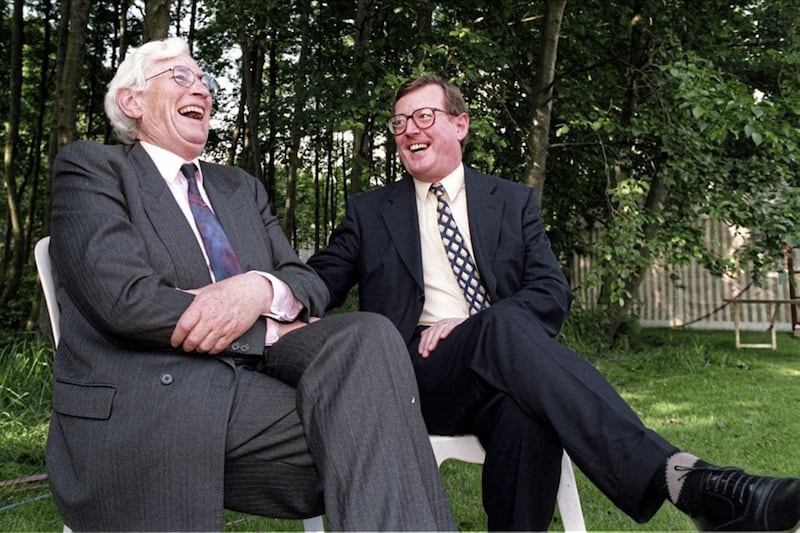The public relationship between Michelle O’Neill and Emma Little-Pengelly may have been under some pressure in recent days, but it still contrasted sharply with the much tenser dealings between David Trimble and Seamus Mallon when devolved powers were first transferred from Westminster to Stormont just under a quarter of a century ago.
O’Neill and Little-Pengelly make sure that they beam regularly for the cameras during their joint appearances, seem generally comfortable in each other’s company and were unperturbed to be dubbed as the sliotar sisters when they visited a camogie club in west Belfast earlier this year.

The interactions between Trimble and Mallon had a stiff atmosphere from the moment when they officially assumed their duties as first and deputy first minister on December 2 1999, and it would have taken a brave press officer to suggest that it was time to lighten the mood.
Read more: Grit and guts saw David Trimble through
We are now in a different era, and it is inevitable that two capable and relatively young women in positions of considerable power will be more focused on imagery than their older male counterparts ever were, but it is also striking that, while three of the four Stormont leaders in question can be regarded as career politicians, Trimble was effectively an outlier.
O’Neill and Little-Pengelly have both had full time political roles since their late 20s, while Mallon was elected to the first Assembly in 1973 while still in his 30s.
Trimble, although maintaining close party links, was usually happier in a legal capacity, and, apart from a brief period in the short-lived Constitutional Convention in 1975, did not hold a permanent elected post until he became an MP in 1990 aged 46.
Read more: David Trimble was never a hypocrite, unlike the DUP’s Brexiteers
Everyone who came across Mallon knew he was steeped in the political process, and was not averse to using his experience in amateur dramatics to introduce a telling pause or a sudden raise of emphasis.

He was noticeably more popular among the SDLP rank and file than the party leader John Hume, and there was sometimes a coolness between the pair, but the grudging respect present was also obvious in the evocative 1985 picture carried in The Irish News earlier this month which showed Hume lighting Mallon’s cigarette at an annual conference.
It is likely that PR advisers would be appalled if a similar photograph was published today, but it summed up a moment brilliantly.
Mallon invariably displayed an air of authority, often accompanied by bluntness, and those summonsed to a meeting in the deputy first minister’s office usually took a deep breath before entering.
Read more: Trimble and Mallon ‘show of solidarity’ after double murder in Poyntzpass helped push for peace
I received such a call after The Irish News ran a keynote editorial endorsing the new policing board back in 2001, before the SDLP, Sinn Féin or the Catholic Church had decided their respective positions.
Mallon let it be known in advance that he was more than slightly vexed not to have been consulted over our intervention, although I could not see any need for a briefing, and the trepidation among his staff was apparent as I arrived.
Invitations to chats with Trimble were more relaxed occasions, with one conducted over a convivial lunch of lamb chops in an office which perhaps symbolically was at entirely the opposite end of Parliament Buildings to Mallon’s base
He fixed me with a cold stare as I set down, which I took as a firm admonishment, and another long theatrical pause followed before with some difficulty we managed to find a degree of common ground on policing issues.
Mallon eventually steered the conversation round to GAA matters, and, referring to our county affiliations, took pleasure in pointing out how much better Armagh were doing than Down - a trend which sadly continues to this day - before wrapping up the conversation in full control of the exchanges.
Invitations to chats with Trimble over the same period were more relaxed occasions, with one conducted over a convivial lunch of lamb chops in an office which perhaps symbolically was at entirely the opposite end of Parliament Buildings to Mallon’s base.
Trimble tended to be on better terms with The Irish News than some of the other Belfast-based news organisations, and the only discordant note came when the name of Bill Clinton was mentioned, as it would be fair to say that the first minister was not a fan.
Mallon and Trimble, both now dead, came from different backgrounds but were heavyweight figures during momentous times
I had huge respect for both of them, and was pleased to see the creation of the David Trimble Chair in Leadership and Organisational Transformation announced by Queen’s University last week on the eve of what would have been his 80th birthday.
Mallon, who always viewed Trimble as an academic rather than a politician, would probably also have allowed himself the hint of a smile.







